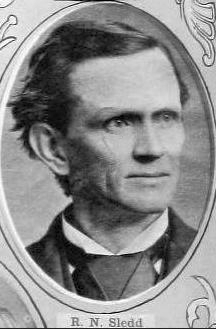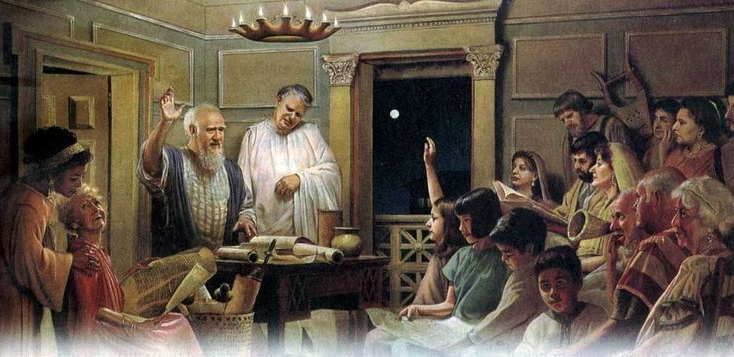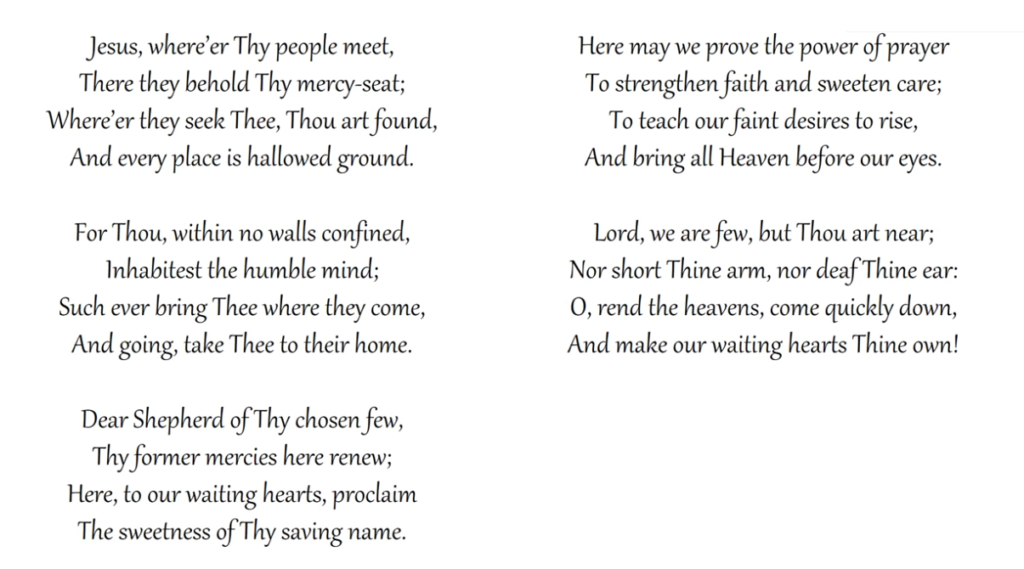Editor’s note: The following is extracted from True Heroism and Other Sermons, by R. N. Sledd (published 1899).
“For we are the circumcision which worship God in the spirit, and rejoice in Christ Jesus, and have no confidence in the flesh.” — Phil, iii, 3.
From the call of Abraham until the death of Christ the Jews were God’s peculiar people. They constituted His visible church. To them “pertained the adoption, and the glory, and the covenants, and the giving of the law, and the service of God, and the promises.” All others were accounted “strangers and foreigners.”
“But when the fulness of time was come, God sent forth His Son, made of a woman, made under the law, to redeem them that were under the law, that we might receive the adoption of sons.” That Son, who was the theme of their prophecies, and the object of their faith and hope, and the antitype of all their sacrificial offerings, has “blotted out the handwriting of ordinances that was against us, which was contrary to us, and has taken it out of the way, nailing it to His cross.” He has broken down the middle wall of partition between Jews and Gentiles, “having abolished in His flesh the enmity, even the law of commandments contained in ordinances.”
The question naturally arises, who now are the peculiar people of God? Those things in which consisted the peculiarities of Judaism distinguishing it from all other systems and separating the Jews from all other peoples have passed away. Those promises of salvation which it appropriated to itself as its exclusive heritage have now been given to all men. The Messiah has come, and, by the sacrifice of Himself, has made atonement not for their sins only but also for the sins of the whole world. Who now are the circumcision? Who now constitute the true Israel, the true church of God? Where is it to be found? What are its essential characteristics?
We have an answer to these inquiries in the text. “We are the circumcision which worship God in the Spirit, and rejoice in Christ Jesus and have no confidence in the flesh.” We have a parallel passage in the letter to the Romans: “He is not a Jew which is one outwardly; neither is that circumcision which is outward in the flesh, but He is a Jew which is one inwardly; and circumcision is that of the heart in the Spirit, and not in the letter; whose praise is not of men but of God.” These scriptures exclude the idea that anything of a mere external character is essential. Nowhere is the outward form of the church a subject of clear and distinct enactment. While the doctrines and morals of Christianity are succinctly defined, the servants of Christ have a large liberty with respect to forms of government and the adoption of measures for the advancement of the ends of the gospel. But these forms and measures do not enter into the essence of the church itself. They are only the scaffolding around the building. They are but temporary in their nature and purpose. When the capstone shall, at last, be brought on with shoutings of “Grace, grace unto it,” they shall disappear and be forgotten forever. We shall then see with a clearness and impressiveness that may not be possible now that the true church of God is comprised only of those who “worship Him in the Spirit, and rejoice in Christ Jesus, and have no confidence in the flesh.”
I. Its first mark is the spirituality of its worship. “The hour cometh, and now is, when the true worshipers shall worship the Father in spirit and in truth; for the Father seeketh such to worship Him. For God is a Spirit, and they that worship Him, must worship Him in spirit and in truth.” Hitherto He had been worshiped in the splendid ceremonial of the Jewish ritual. But every part of that ceremonial was typical — a shadow of good things to come. Now these types are all fulfilled, and we have the substance, these good things, in the gospel. There is no longer need of such ceremonial, for we now have access by faith in the presence of God, and, as spiritual beings, are privileged to hold direct intercourse with Him.
God is a Spirit as man is a spirit, but with this difference: God is infinite, while man is finite; God is above all, and in all, and through all; while man is subject to the limitations and oppressions of matter, and the disadvantages of multiform imperfections. To worship Him in spirit is to worship Him in the exercise of those powers that make us spiritual beings and in which is found our likeness to God. Our intellect contemplates and meditates on His adorable perfections; our judgment reverently approves all His methods and means of providence and grace; our will bows submissively to His decisions; our conscience, abhorring evil in all its forms, responds promptly and perfectly to every demand of His in finite rectitude, while our hearts glow with ardent love to Him, and our spirits exult in His matchless grace. To a soul thus in harmony with Him, and renewed after His image, what need can there be for a gorgeous ritual? A child of God, a partaker of the divine nature, having in him, though in an infinitely inferior degree, the moral perfections of the infinite Spirit, he feels that forms and ceremonies are but so many hinderances in the way of his communion with his Father. He has no need of words, nor of any external symbols in which to express the yearning, the adoration, the trust, the love, the joy of his spirit in communion with God. When under the influence of the Holy Spirit, we can thus rise superior to everything that is merely formal and outward, and in our spirit adore, and praise, and trust, and rejoice in God, we reach the highest perfection of spiritual worship attainable in the flesh.
The truest worship of the soul cannot be expressed either by symbol or word. The soul’s deepest feelings and longings and sweetest joys cannot be framed into human speech. Inspired by the Eternal Spirit they can be understood only by Him, and meet their response only in Him.
When, therefore, we begin to use words, we begin to recede from pure spirituality. As we multiply words the distance increases. When we resort to acts in addition to words, such as bowings, and crossings, and sprinklings, and the burning of incense, and the ringing of bells, we are at a still greater remove from spirituality. When to this we add beads and paintings and sculpture — when the soul has to interpose all these things between itself and God and can approach Him only through these media, it is at the utmost boundary of spiritual worship, if indeed spiritual worship be possible at all under such conditions.
A worship purely spiritual is possible only to the individual. Hence the Christian’s sweetest moments are spent alone with Jesus. The collective body of Christians assembled for worship must of necessity have some form. That body which has the least and simplest form, provided that in its use it gives true expression to the essential elements of worship, makes the nearest approach to pure spirituality, because it has fewer intervening media, it comes more directly to God.
There are forms of worship that in their literary aspects are faultless. They are thoroughly scriptural in every sentiment, and highly artistic and beautiful in arrangement and execution. The man of refined taste cannot fail to admire them. Against them we have not a word or thought of protest. But alas for the weakness of our nature; we are prone to mistake intellectual and aesthetic gratification for spiritual elevation and refreshment — prone to substitute the outward form for the inward reality, the letter for the spirit, the shadow for the substance. Not through fault in the form, but through weakness in ourselves the use of the form seems naturally to tend to make us formal rather than spiritual worshipers. The Great Teacher possibly had this weakness of our nature in mind when he proclaimed to the Samaritan woman, as one of the highest privileges of the gospel dispensation, that men should be delivered from the yoke of a ritualistic worship, and without form or ceremony, anywhere, at any time, under any conditions, hold communion with the Father of spirits. The woman, in common with her people, believed that worship to be acceptable must be offered at a particular place and in a particular way; Jesus teaches her that the worship of the soul, is not conditioned on time, or place, or any formalities of action or of speech. In harmony with this, Peter describes the true church as “a chosen generation, an holy nation, a peculiar people,” “a royal priesthood to offer up spiritual sacrifices acceptable to God by Jesus Christ.”
II. The second mark of the true church is its joy in Christ Jesus. “The work of righteousness is peace, and the effect thereof quietness and assurance forever.” “The fruits of the spirit are love, joy, peace.” “Whom having not seen, ye love; in whom, though now ye see Him not, yet believing, ye rejoice with joy unspeakable and full of glory.” When the soul is awakened by the Spirit of God, and discovers its pollution, guilt, and peril, it is filled with dismay and dread. When that Spirit reveals to it the tenderness and love of God, and the baseness of its own ingratitude, it is overwhelmed with the bitterness of penitential grief. When it finds its tears, its prayers, and its strugglings all unavailing, the gloominess of despair begins to settle down upon it. But when out of the depths it cries unto God in Christ, in humble trust in His mercy and grace, the tumult subsides into a blessed calm; a “peace that passeth all understanding” takes possession of the spirit. “Being justified by faith, we have peace with God through our Lord Jesus Christ; by whom also we have access unto this grace wherein we stand, and rejoice in hope of the glory of God.” Along with forgiveness comes the regeneration of the soul, adoption into the family of God, and the witness of the Spirit. The soul is conscious of this glorious work. Conversion carries with it its own evidence. It is a translation from darkness to light and from the power of Satan unto God. It is the opening of the prison doors, breaking the chains of the captive and bidding him go in peace. It is a new creation: “Old things have passed away, behold all things have become new.” The guilt that oppressed the soul, the anguish that rent the heart in pieces, the fear that hath torment, all are gone. The man needs no one to tell him that his iniquity is forgiven, his transgression covered. He has the witness in himself. And as the smile of God lights up the soul, and the love of Jesus warms and thrills it with a new life, and the witnessing Spirit assures it, and hope of glory inspires it, he cannot but rejoice in the Lord and joy in the God of his salvation. The language, if not of his lips, yet of the inmost depths of his soul is: “O Lord, I will praise thee: though Thou was angry with me, Thine anger is turned away and Thou comfortest me. Behold, God is my salvation; I will trust and not be afraid; for the Lord Jehovah is my strength and my song: He also is become my salvation.” What more natural and becoming than that the soul thus delivered, and transformed, and made an heir of eternal life, should rejoice in Christ Jesus?
Some men, it is true, look with disapproval and suspicion on all outward demonstrations of Christian joy. They can organize magnificent processions and with banners and music, song and shout and weary march, prolong far into the night their celebration of a political victory. But if a soul, consciously “redeemed from the power of sin,” speaks forth in glad acclaim the praises of the great Deliverer, they call it “animal excitement,” “enthusiasm,” “fanaticism.” One says, “I cannot worship when there is any exhibition of that sort.” Another says, “it destroys all my enjoyment of the service;” and another, “I do not believe in any such thing; I have been in the church these twenty-five years, and I never felt the slightest disposition to rejoice.” What a blessing to all such gainsayers that they did not live in apostolic days! What would they have done had they been present on that memorable day when “Suddenly there came a sound from heaven as of a rushing mighty wind, and it filled all the house where the disciples were sitting… And they were all filled with the Holy Ghost, and began to speak with other tongues as the Spirit gave them utterance.” How out of place would they have been in the infant church, when “all that believed did eat their meat with gladness, and singleness of heart, praising God and having favor with all the people.” What will they do when the shouts of that great multitude which no man can number, shall break upon their ears!
But despite the cavil, we insist that the assurance of sins forgiven through Jesus Christ is the privilege of all who believe in Him, and that that assurance brings a heavenly joy into the soul. That joy seeks and will find expression. Paul and Silas, still bloody from recent scourging, and with their feet in the stocks in the inner prison, broke the silence of the midnight hour with their songs of gladness. Now as then the heart, full of the love of Jesus and the joy of His salvation, is always singing. Cast down, suffering, breaking it may be, but still it sings and rejoices. Oh, it is a joy which no prison walls, or sword, or stake, or scaffold, or “great fight of afflictions” can repress or silence; a joy which in its fulness and richness cannot be pressed into the cold form of human speech; a joy unutterable and full of glory; a joy which, when death shall have broken down the earthly house of this tabernacle, shall burst into a rapturous shout of everlasting praise.
The church that preaches this privilege of believers the most plainly and presses it most urgently; the church whose members seek this experience of grace the most earnestly and attain it the most generally; the church that rejoices most in Jesus Christ, has the most solid claim to the glory of being the true church of God. May this glory be ours! The joy of the Lord has been our strength in the past. Sad day for any church, will it be when its ministry and membership undervalue, or are strangers to this experience of Christian joy. Sad day for any man or woman in the church when they are indifferent to their personal attainment of this experience. Samson, shorn of his locks, was not an easier prey to the Philistines than is the church or the individual without the joy of salvation, to the seductions of the world, the flesh, and the devil. We know that the alleluias of our fathers often gave them the victory.
Let us know this joy in Christ and victory equally signal and splendid will crown our labors and our lives.
III. A third mark of the true church is a complete distrust of everything merely external in so far as any saving benefit to be derived from it is concerned. “And have no confidence in the flesh.” The apostle explains what he means by “the flesh” in the context: “If any other man thinketh that he hath whereof he might trust in the flesh, I more: circumcised the eighth day, of the stock of Israel, of the tribe of Benjamin, an Hebrew of the Hebrews; as touching the law a Pharisee; concerning zeal, persecuting the church, touching the righteousness which is in the law blameless.” These things had been his boast, and the boast of his ancestors for centuries. “But,” said he, “what things were gain to me” — those things which were my pride and glory and in which I trusted — “those I counted loss for Christ. Yea doubtless, and I count all things but loss for the excellency of the knowledge of Christ Jesus my lord.” He is Messiah the Prince, Prophet, Priest and King — the true sacrifice, the antitype of all sacrifices, who, by the offering of Himself, has made atonement for the sins of the world. He is the life, the truth, the way, by whom alone we can have access to God. His is the only name given under heaven among men whereby we can be saved — the only foundation on which we can build, with security, the house of our faith and hope. He alone is worthy of the soul’s confidence. He alone can meet its needs. Forms and ceremonies, provided they be simple, may be helpful to some. Outward privileges of birth and education, and wealth, and religious associations, and church fellowship, and church promotion, may be desirable and profitable. Certain sacramental rites are obligatory, because enjoined by the Master; and their due observance is essential to spiritual growth. But to have confidence in any of these things as meritorious is to repeat the folly of the Pharisee and build our hopes on the shifting sands. There is but one Shibboleth known in the kingdom of God, one pass-word to its spiritual immunities on earth and its glories in heaven. Search its records. Study its history. What is that one, all important prerequisite ? Not natural descent from Abraham; not scrupulous observance of the formalities of religion; not the imposition of apostolic hands; not baptism by whatever mode administered; not eating and drinking in the Master’s presence; not membership in His visible church; not zeal for a particular creed or denomination; not working, and sacrificing, and suffering and dying for the right; but simply and only trust in Jesus Christ; sitting at His feet and learning of him as our Prophet, confiding in Him as our atoning and interceding high-priest, and gladly submitting to Him as our King. Confidence in the flesh, or in the external and formal is nothing; confidence in Him is everything in this great enterprise of salvation. No creed of which He is not the soul, no worship which is not inspired by His Spirit, no preaching of which He is not the theme is worth a bauble as a means of salvation. Away then with all confidence in the flesh, all trust in the outward, the seen, the temporal. “Let not the wise man glory in his wisdom, neither let the mighty man glory in his might; let not the rich man glory in his riches; but let him that glorieth glory” in the cross of our Lord Jesus Christ. By that cross we are crucified unto the world, and lifted above its tempests into eternal sunshine.
“Oh! the sweet wonders of that cross,
Where God, the Saviour, loved and died!
Her noblest life my spirit draws,
From His dear wounds and bleeding side.
“I would forever speak His name
In sounds to mortal ears unknown;
With angels join to praise the Lamb,
And worship at His Father’s throne.”
Each of these three characteristics of the true church — the spirituality of its worship, its joy in Christ, and its distrust of the flesh — teaches the same lesson. They pour their concentrated light upon one great truth, and present it in such clearness and impressiveness that we cannot mistake its import. It was the deadly error of some in the olden time that they had “a form of godliness, but denied the power thereof;” and of others the faithful and true Witness said, “Thou hast a name that thou livest, and art dead.” The religion of the gospel is not a form; it is not a name. The Jewish ceremonial, though divinely instituted and administered by men divinely appointed, was not religion. Of some of those most scrupulous in its observance, the Master declared that outwardly they appeared righteous unto men, but that within they were full of hypocrisy and in iniquity. Name or reputation for religion is very different from religion itself. An individual or a church may have such a name and yet be as destitute of religion as the dead carcass is of the breath of life. Religion is a life — spiritual life — the life of God in the soul. It begins in the quickening of the soul dead in trespasses and sins into newness of life by the power of the Holy Ghost. It is sustained by constant feeding by faith on Jesus Christ. Said He, “I am the living bread which came down from heaven: if any man eat of this bread, he shall live forever.” There is no substitute for this bread. Other things may feed the intellect, or gratify the taste, or excite the emotions; this alone nourishes the soul, and developes the spiritual life to maturity. It is useless to inquire, “How can these things be?” The answer is the same now as of old: “The wind bloweth where it listeth, and thou hearest the sound thereof, but canst not tell whence it cometh, and whither it goeth; so is every one that is born of the Spirit.” As religion is a life in Christ, so is it a fellowship, a communion, a oneness of the soul with God. He is the blessed fountain of spiritual life; in Jesus Christ it is treasured up in all its richness and fulness, and from Him communicated by the Spirit to the believing soul. “I am the vine, ye are the branches.” The life in the branch is identical with the life in the vine. The life in the believer is identical with the life in Christ. This is religion in its essential principle — the Christ-life in the soul. Anything short of this, however orthodox, however beautiful and impressive, will fail us in the last hour, and before the judgment throne. Christ in you is the only solid ground for the hope of glory. Do we know this life? Are we dwelling in Him, and He in us? What say our souls to these things?










